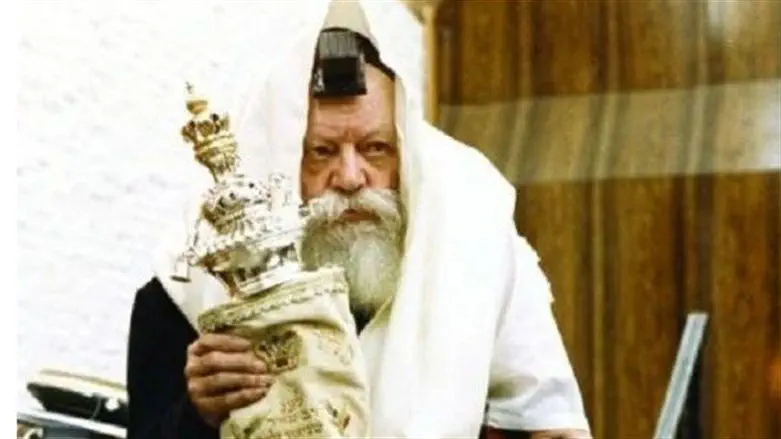
 Tanya/Iggeres Ha’Kodesh - The Holy Epistle, Epistle 3, Class 3
Tanya/Iggeres Ha’Kodesh - The Holy Epistle, Epistle 3, Class 3And from a reflection of a reflection of the abovementioned encompassing light, by means of a powerful contraction,
וּמֵהֶאָרָה דְהֶאָרָה מֵ"אוֹר מַקִּיף" הַנִּזְכָּר לְעֵיל, עַל־יְדֵי צִמְצוּם רַב,
a garment is made in the Lower and Upper Gardens of Eden for the [soul-levels called] nefesh-ruach-neshamah of man,
נַעֲשֶׂה לְבוּשׁ לִבְחִינוֹת נֶפֶשׁ־רוּחַ־נְשָׁמָה שֶׁל הָאָדָם בְּגַן עֵדֶן הַתַּחְתּוֹן וְהָעֶלְיוֹן,
enabling them to derive pleasure and attain some apprehension and illumination from the [infinite] Ein Sof-light which is diffused in the Garden of Eden, as is explained elsewhere.9
שֶׁיּוּכְלוּ לֵיהָנוֹת וּלְהַשִּׂיג אֵיזֶה הַשָּׂגָה וְהֶאָרָה מֵאוֹר־אֵין־סוֹף בָּרוּךְ־הוּא, כְּמוֹ שֶׁמְּבוֹאָר בְּמָקוֹם אַחֵר.
For, unaided, the finite soul would never be able to apprehend this infinite radiance.
This is the meaning of the teaching of our Sages, of blessed memory:10 “In this world, there is no reward for [the fulfillment of] the commandments.”
וְזֶה שֶׁאָמְרוּ רַבּוֹתֵינוּ־זִכְרוֹנָם־לִבְרָכָה "שְׂכַר מִצְוָה בְּהַאי עָלְמָא לֵיכָּא",
They do not say that “in this world, there is no reward granted…,” rather that “there exists no reward in this world….”
For in this world, which is physical and in a state of limitation, a state of great and most extreme contraction,
כִּי בָּעוֹלָם הַזֶּה הַגַּשְׁמִי וּבַעַל גְּבוּל וְצִמְצוּם רַב וְעָצוּם מְאֹד מְאֹד,
it is impossible that any reflection of the [infinite] Ein Sof-light should become invested,
אִי אֶפְשָׁר לְהִתְלַבֵּשׁ שׁוּם הֶאָרָה מֵאוֹר־אֵין־סוֹף בָּרוּךְ־הוּא,
except by means of the ten sefirot, which, in the sacred Zohar, are referred to as the “Body”11:
כִּי אִם עַל־יְדֵי י' סְפִירוֹת, הַנִּקְרָאִים "גּוּפָא" בַּזּוֹהַר הַקָּדוֹשׁ:
The Alter Rebbe will soon explain that just as body and soul are incomparable, so are the sefirot infinitely distant from the [infinite] Ein Sof-light.
As a reward for performance of the commandments, one is enabled to draw down the infinite degree of light, but this light cannot possibly descend within this world, which is bounded. Thus, “In this world, there is no reward for [the fulfillment of] the commandments.” No such revelation can possibly be clothed in this world, for whatever illuminates and clothes itself in this world derives merely from the level of the ten sefirot, which the Zohar terms the “Body.” Thus, for example:
“[The sefirah of] chesed (‘kindness’) is [called] the [supernal] ‘right arm’; [gevurah (‘severity’) is [called] the ‘left arm,’]” and so on.
"חֶסֶד דְּרוֹעָא יְמִינָא כוּ'".
For just as there is no comparison between the physical body and the soul,
לְפִי, שֶׁכְּמוֹ שֶׁאֵין עֲרוֹךְ לוֹ לְהַגּוּף הַגַּשְׁמִי לְגַבֵּי הַנְּשָׁמָה,
so is there no comparison whatsoever between the ten sefirot of Atzilut and the Supreme Emanator, the [infinite] Ein Sof.
כָּךְ אֵין עֲרוֹךְ כְּלָל לְי' סְפִירוֹת דַּאֲצִילוּת לְגַבֵּי הַמַּאֲצִיל הָעֶלְיוֹן אֵין־סוֹף בָּרוּךְ־הוּא,
For in relation to the Ein Sof, even the supreme chochmah (“wisdom”), which is the first of the sefirot, is on the plane of material action,
כִּי אֲפִילוּ חָכְמָה עִילָּאָה, שֶׁהִיא רֵאשִׁיתָן, הִיא בִּבְחִינַת עֲשִׂיָּה גוּפָנִית לְגַבֵּי אֵין־סוֹף בָּרוּךְ־הוּא,
as is explained in Likkutei Amarim.12
כְּמוֹ שֶׁנִּתְבָּאֵר בְּלִקּוּטֵי אֲמָרִים.
_______
FOOTNOTES
____________
9. See below, Epistle 29.
10.Kiddushin 39b.
11. Note by the Rebbe: “[The level termed ‘Body’ is] infinitely lower than its soul, the Ein Sof-light.”
12. Note by the Rebbe: “…The reference is evidently to Part II, chs. 8-9, which furnish a more extensive explanation of this subject than is offered here. Even less explanation than here is offered in the Alter Rebbe’s Note to Part I, ch. 2; it is thus clear that the above reference cannot be to this source. It is true that in Iggeret Hateshuvah, ch. 4 (and elsewhere), the Alter Rebbe, when applicable, specifies ‘Part II’ of Likkutei Amarim, but this is done only where he wishes to cite an exact location, as we see from his concluding words (‘ch. 11’). This is not the case here.”